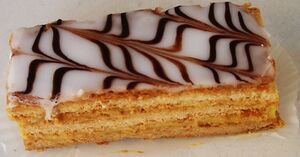Icing

Icing is the collective name for various types of (usually) cake toppings and fillings and there are several varieties that can be used:
- Glacé icing
- Royal icing
- Fondant icing (sugar paste)
- Mexican paste
- Ganache
- Buttercream icing
- Cream cheese icing
- Flower paste
- Modelling paste
- Pastillage
- Poured fondant
Glacé icing
A very simple icing, often drizzled over Fairy Cakes or larger cakes and used for feathering on Mille-feuilles. It is runny and shiny and probably the easiest icing to work with. It is made from icing sugar and water with the optional addition of flavourings and/or colourings.
For every 100g of icing sugar, mix in about 13-20mls boiling water, depending on whether you are adding additional liquid. It takes around 30 minutes to set, but will not set hard. If you prod it, it will crack.
Royal icing
Royal icing sets rock hard and solid and is made from icing sugar, whisked egg whites, and lemon juice (or vinegar), but sometimes glycerine is added if you want a softer icing - however this is only suitable for covering cakes. It is normally used to cover celebration fruit cakes such as wedding and Christmas cakes which have a marzipan base. It can also be used for some decorations, including piping. It takes about to set 4-6 hours to set for a thin layer, but very thick layers can take several days. For coating cakes, it is best apply it in several thin layers, allowing it to dry each time in between. It will keep in a cool area for 1-2 days in a bowl covered with a damp tea towel.
For every 225g of icing sugar, use 1 egg white, 1 tsp lemon juice or vinegar and ½ tsp glycerine (if using). If you are reluctant to use raw egg whites for safety reasons, you can either pasteurise your eggs first or use a substitute such as albumen powder or dried egg whites.
Fondant icing (sugar paste)
Mexican paste
Ganache
Buttercream icing
Buttercream is a type of icing or filling used inside cakes, as a coating, and as decoration. In its simplest form, it is made by creaming butter with icing sugar, although other fats can be used, such as margarine. Colourings and flavourings are often added, such as chocolate, fruit purees, and various extracts. Buttercream is a common topping for cupcakes and sponge cakes.
For every 125g softened, butter, use 300g icing sugar, 1 tablespoon of milk, plus ½ tsp vanilla extract or other flavourings. You can also add a few drops of food colouring if desired. Beat the butter in a bowl then add a quarter of the icing sugar and beat until smooth. Continue in this way until all of the icing sugar is thoroughly incorporated into the butter. The mixture should be creamy and smooth. Beat in the milk, if necessary, to loosen the mixture. Stir in the flavouring and colouring (if using) until well combined.
Cream cheese icing
Flower paste
Modelling paste
Pastillage
Poured fondant
#icing #icingsugar #butter #vinegar #lemonjuice #glycerine #eggwhite #eggwhites #cakes #vanillaextract #chocolate